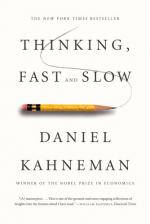
|
| Name: _________________________ | Period: ___________________ |
This quiz consists of 5 multiple choice and 5 short answer questions through Chapters 25 - 29.
Multiple Choice Questions
1. Who created the Cognitive Reflection Test that involves the bat-and-ball problem along with two others?
(a) Larry Jacoby.
(b) Danny Oppenheimer.
(c) Daniel Gilbert.
(d) Shane Frederick.
2. What are statistical base rates?
(a) Statistics that describe maximum imput.
(b) Facts about the history of a decision.
(c) Facts about a population to which a case belongs.
(d) Observations about a group of people.
3. What is a reliable way to make people believe in falsehoods?
(a) Frequent repetition.
(b) Looking to the left.
(c) Standing boldly with arms crossed.
(d) Nodding.
4. The author compares the conscious mind with what in Chapter 5?
(a) A ship's mast.
(b) A ship's hull.
(c) A cemetery.
(d) A cockpit.
5. Who is the author's Princeton colleage that wrote "Consequences of Erudite Vernacular Utilized Irrespective of Necessity: Problems with Using Long Words Needlessly"?
(a) Daniel Gilbert.
(b) Danny Oppenheimer.
(c) Larry Jacoby.
(d) Shane Frederick.
Short Answer Questions
1. Who wrote Judgment in Managerial Decision Making?
2. Where did Kahneman and Tversky present their Linda study to doctoral students in the decision-science program?
3. Who coined the term "mere exposure effect"?
4. The author states in Chapter 25, "Gambles represent the fact that the consequences of choices are" what (526)?
5. What do we lose touch with when we are uncomfortable or unhappy?
|
This section contains 232 words (approx. 1 page at 300 words per page) |

|




